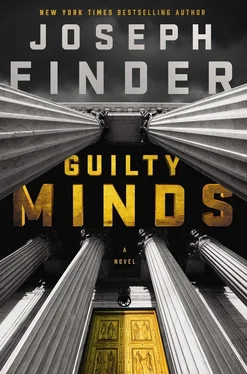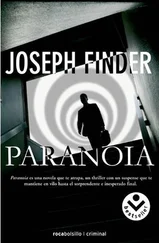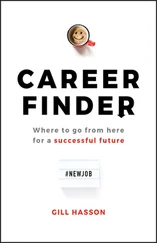“Mandy Seeger is a top-notch reporter, but she got taken in by a clever hoax. Jeremiah Claflin never had a relationship with a call girl, period. Full stop.”
“Of course not,” Gunn said with a smirk.
“You jumped the gun. You ran the story without giving Mandy the chance to meet with Gideon Parnell, who would have set her straight. That’s what the lawyers call reckless disregard for the truth.”
“We put the story up this morning because our intel told us we were about to be scooped. That’s all. It turns out to be the biggest story we’ve ever run, and it’s getting us attention all over the world. That’s what I’d call a successful story.”
“If you’d waited, as you and Gideon agreed, you’d have learned the truth. You would have learned, for instance, that although rooms in the Hotel Monroe were booked under Claflin’s name on three different evenings, at no times were the keys used to enter the room. Claflin never stayed there. Here’s a printout of the audit report.” I slid a file folder of documents across the table to him.
He shrugged. “That’s the best you’ve got?”
I went on, ignoring his taunts. “You were used by a call girl. Someone paid her to get in touch with Mandy Seeger and you fell for it. As a result, you’ve done grave damage to the integrity of the chief justice of the Supreme Court.”
Gunn blinked again, slowly. One, two, three. “You work for the powers that be, Heller. I work against them. You’ll forgive me if I don’t immediately credit your claims. And claims are all they are. Are we done here? TMZ TV is waiting to interview me.”
I slid a tall stack of paper across the table.
“More printouts from the Hotel Monroe?” he asked.
I shook my head. “These are call-detail records. From Kayla Pitts’s cell phone. That’s Heidi L’Amour’s real name, in case you didn’t know. Proving without a doubt that she couldn’t have been meeting with Justice Claflin in the Hotel Monroe. She was in Pearl, Mississippi, on two of those nights, visiting her sister in prison. On the third night she was at a sports bar called the End Zone, in Arlington, Virginia.”
Gunn blinked again, slowly, twice, and pulled his hands away from the stack of printouts as if they were hot to the touch. He looked at the top page and then looked at his general counsel. He muttered something to her, then took out a cell phone. He pressed one key and put it to his ear. “Eric, I need you to take a look at something. Yes.”
He ended the call.
A moment later a scrawny redheaded man wearing a lime-green polo shirt entered the conference room. He went up to Gunn and tapped the stack of documents.
“This?” he said.
Gunn nodded. “This is Eric Ziegler, my chief technology officer,” he said.
Eric took the stack of paper with him and left the room.
“Uh, the chief justice is a public figure,” Emily said crisply. “It’s extremely difficult for a public figure to sue for libel.”
“Not at all,” I said to her. “As you know, his lawyers simply have to prove ‘actual malice.’ The malicious and reckless disregard for the facts. Which is going to be nice and easy, since your reporter was given the opportunity to meet with Gideon Parnell and learn the truth. Before you ran the story. A meeting you canceled.”
“Is this true?” Emily said to Gunn.
He shrugged dismissively.
“So you didn’t do your due diligence,” I went on. “The fact that you had the opportunity to correct your fabrications and you didn’t take it shows actual malice. I don’t know how you put a dollar figure on the reputation of the chief justice of the Supreme Court, but we’re going to start at one hundred million dollars and go up from there. Which will put Slander Sheet out of business and you into personal bankruptcy.”
“You’d never get that,” he said.
I went on, “You see, Julian, juries these days are turning against the power of irresponsible media to destroy the lives of innocent people. Maybe one hundred million dollars in damages is too small. Maybe we go for half a billion.”
Gunn’s phone rang. He answered it with a smug smile. “Eric?”
He listened for a moment. I watched as his expression molted from arrogant, self-satisfied gloating to what looked a lot like sea sickness. Without another word, he ended the call. He seemed about to throw up. He stood up feebly.
“Emily?” he said, and his general counsel got up as well, and the two of them left the conference room.
While I waited, I checked my e-mail, then my voice mail. I’d gotten a call from my DC cop source, Art Garvin. I recognized his cell number. I was about to call him back when Gunn and his general counsel returned to the room.
“Okay, Heller,” Gunn said quietly. “Appears that you’ve won this battle. But you’ve just set out on a long road that has no turning.”
“What does that even mean?” I said.
“I’m going to loose the investigative hounds on you. You’ll be a ruined man. I am not an enemy you want to have, as you’ll soon—”
“What do we need to do?” Emily said, cutting him off. And I realized right then that she was calling the shots. Not Julian Gunn. “What do you want, Mr. Heller?”
I checked SlanderSheet.com in the Suburban on my way back to the Shays Abbott offices, and sure enough, the Claflin piece was gone, replaced by a notice, bordered in black:
A Note to Our Readers
This morning Slander Sheet posted an item concerning the private life of Supreme Court Chief Justice Jeremiah H. Claflin. We published the article in the firm belief that it was accurate. Given new information received by Slander Sheet, however, we have come to the conclusion that we were mistaken in publishing this item, and we extend our deepest apologies to Chief Justice Claflin and his family.
Ordinarily I should have been feeling some satisfaction, the glow of victory — I’d accomplished what I’d set out to do, what I’d been hired to do — but that wasn’t how I felt at all. I felt uneasy. I knew that something was very wrong.
The call girl, Kayla Pitts, had obviously been coerced into making a false accusation. She was scared. She had some ex-cop following her, protecting her or watching her. What was her story? How had she gotten involved in a scam targeting Justice Claflin? Who else had been involved? Who was behind it, and what was the objective?
This case was over, but it didn’t feel that way to me.
I called my office in Boston. Jillian answered and filled me in on what was happening there, which wasn’t a lot. “I’ve decided to stay in Washington another day,” I told her. “To tie up loose ends. Keep me in the loop by e-mail, and call if there’s anything urgent.”
I returned to the hotel and told Dorothy the plan. “That’s fine with me,” she said. “I was planning on staying a few days longer anyway, take some personal time. Also, I think we should have a celebratory dinner somewhere nice.”
“Absolutely.”
“Restaurant Nora okay with you?”
“If you can get us in, sure.”
“Oh, Nick, you asked me to look into why Mandy Seeger left The Washington Post ?”
“Oh, right.” I laughed. “I forgot about that. Why did she leave the Post , anyway?”
“She got fired.”
“Really?”
“Yeah, really. Apparently she violated the Post ’s policy against lying to sources — she pretended to be a defense contractor or something when she was working on some big story about corruption in the Pentagon. The Post doesn’t allow its reporters to misrepresent themselves, to lie about who they are to get a story. She went too far.”
“Huh.”
Читать дальше












